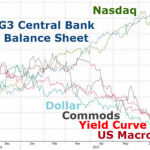The crumbling of Turkey’s economy could drag eurozone down, short EUR/USD?
Turkish Lira went into freefall last Friday after President Trump slapped tariffs on Turkey’s steel exports.
The trouble Turkey is facing is not just a localized issue, but a contagious one. European Central Bank is worried about non-hedged exposure of European banks to Turkish companies and if Turkish banks fail, there’s no question that it will affect markets around the world.
Investors are increasingly concerned about the $350b in foreign debt held by Turkish banks and companies, and their ability to finance it as the currency weakens and inflation soars. As the crisis has deepened Turkish consumers have faced sharply rising food, fuel and medicine prices. The inflation rate is expected to jump rapidly from the current 15.4% official rate. If foreign lenders stop rolling over their loans to Turkish banks and companies, the whole economy could grind to a halt in what investors call a “hard landing” scenario. If that happens, economists are starting to predict that Turkey will eventually be knocking on the IMF’s door.
Banco Bilbao Vizcaya Argentaria, UniCredit and BNP Paribas have the greatest exposure to Turkish debt and many of their loans are unhedged. According to data from the Bank of International Settlements, Spanish lenders are the most exposed followed by Italian and French banks. Exposure to Turkey could affect European banks’ bottom lines “and could have a domino effect throughout Europe as people begin to pull out of those banks and into the US.
Just this year, Lira has lost 33% of its value and its cost of servicing its debt has risen to the highest level in 9 years. If Turkey’s economy crumbles more migrants could be headed to the EU, making Turkey a political and economic crisis for the region.
Apart from the political risk euro is facing from Turkey, there are a few reasons why we feel euro could remain weak for the longer term.








Leave A Comment